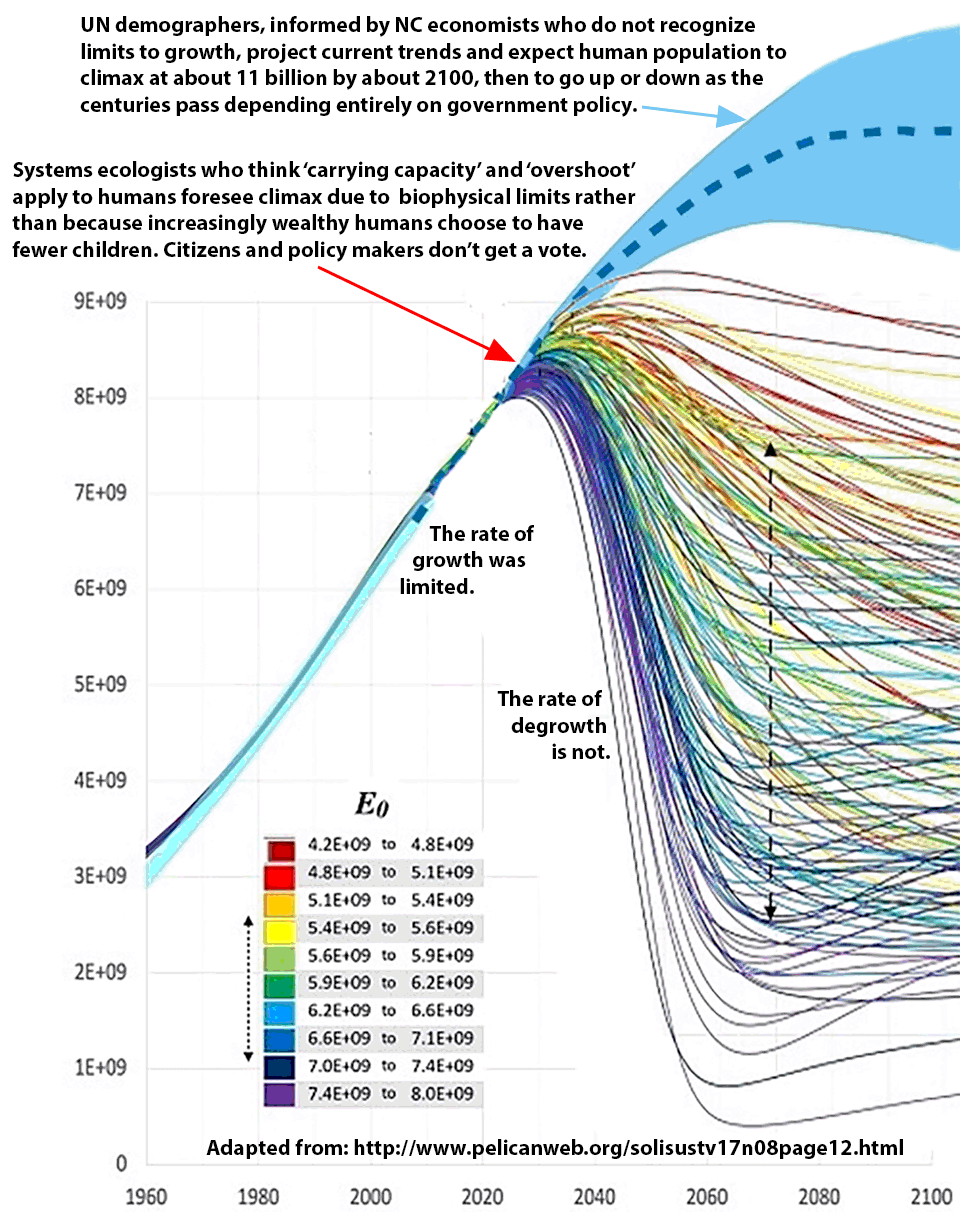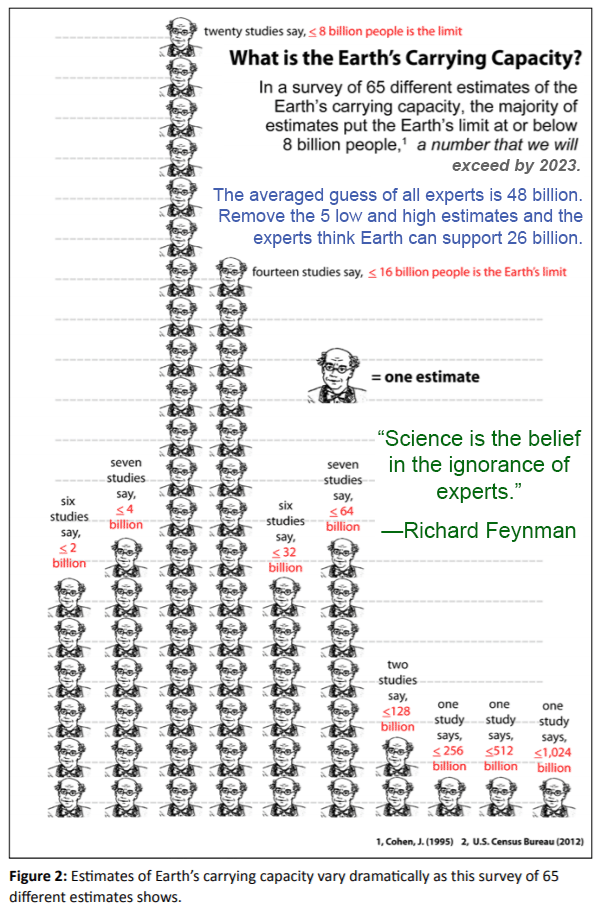
SUNDAY, FEB 20, 2022: NOTE TO FILE

Is there Hope for Humans on this Planet?
There can be only one solutionatique
Eric Lee, A-SOCIATED PRESS
TOPICS: HOPE PERSISTS UNTIL IT CAN'T, FROM THE WIRES, WE WILL UNDERSTAND OR DIE
Abstract: I have noted most of my Quora answers and this is #334. I have answered 500 questions to date, but many questions that in some way relate to our carrying capacity overshoot event or growth culture, receive the same reply after a paragraph or a few by cut and paste. The last 3/4th of this answer has been thereby spread many times in such answers. Sometimes I note the start of the answer/response and omit the repeated part or just don't add the answer to a NOTE TO FILE as there may be too little difference with other noted answers. The answer below is as it appeared to Quora readers (apart from some editing). Similar answers have had over a thousand views, but this one had exceptionally few (<20), but the person who asked the question did upvote it. So far, 500 answers (mainly answered to share sources, via 50 links, that may have value) and counting, but no one likes any of them enough to take in the brave new worldview offered. In nearly 3 years I've had over 200k views, 500 upvotes, 240 comments, and 56 shares, but no indication that any offerings have been spread. Some are shared, but no indication that doing so was successful. By chance, some like something I type or a graphic enough to click 'Upvote'. I have no known readers. Few if any authors can claim to have no readers (beyond one, rarely a few, offerings) after seven years, including friends and family. I guess I can claim to not be average, just not with any social approbation implied.
COOS BAY (A-P) — The original question was, 'Where is the hope for humanity?, which was changed to 'Is there hope for humanity on this planet?' the day after I replied. The question came from an agriculture science graduate since 2015 in India. It did not sound like a homework question (which I don't answer).
----------------------------------
he big question, after realizing that humanity has a problem (sort of like the astronauts on Apollo 13 had, but more complex), one that is an existential threat to our continuance as a species (and other species via Anthropocene mass extinction event), is: ‘Is there any hope for posterity?’ Only a modern human could think it is all about them surviving to enjoy their wealth.
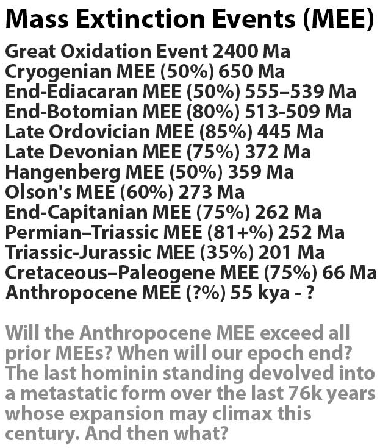
The human predicament, our problematique or meta-problem is our hope, the best thing that ever happened to humanity IF we can understand it. Our problematiques are also called wicked problems (e.g. our behavioral sink/loss of functional behavior typically over 8 to 20 generations of overdensity living (e.g. urban dwelling), our condition of carrying capacity overshoot, the mass extinction event we (our overshoot event) are the cause of…, on down to lesser problematiques like climate change, microplastic pollution, declining sperm count…).
None of our problems can be solved separately because all are interrelated, all are one problematique to which there can be one solutionatique (our hope depends on understanding our predicament, the one that growth and development has gotten us into). There are perhaps many potential solutionatiques, but only one can be realized in our one-off timeline/future. One will work or we go extinct, whether extinction takes a century, a millennia, or an eon (the ending of the Anthropocene whether in some decades or millennia).
Our problematique, to state it in three words, comes from Ludwig Wittgenstein: ‘Understand or die’ (the words are from his teacher, Bertrand Russell, who was summing up Wittgenstein’s genus). The solutionatique (our hope), in 9 words, comes from Baruch Spinoza: To understand something is to be delivered from it. If you can choose to not understand, then you will choose to not understand (and die).
Oh, but both are saying the same thing…, which is not surprising if their insight is true to the nature of things. Words are not true, not out there, but may point to the what-is that is (out there), that does not go away if we don’t believe in it.
For nearly four billion years our ancestors had one hope: to become ancestors and some did. Could some humans (modern techno-industrialized Homo sapiens sapiens var. narrator) become ancestors?
Perhaps, but realize that ‘some’ may mean 0.0001% of modern techno-industrial (MTI) humans who may come to understand the planet and learn to live with it properly (i.e. become non-MTIed recovering humans).
Our hope is that some do and come to prevail numerically over those who do not (e.g. takers/marauders), those who see the planet as a resource for the taking, those who are energy and posterity blind (as those who may come to persist cannot be).
Understand that our predicament is a one-off overshoot dynamic of exceeding limits for a time having the dissolution of our MTI society as outcome (if not extinction). Our growth hegemon (not remotely sustainable) will climax and descend/collapse. Over 8 billion humans will pass through a bottleneck event (die-off). The unknown is what sort of human will be selected for (and against), and how many in the Great Selection to come remain.
And then what? Will humans on the downslope, over perhaps 8 to 20 generations, reacquire functional behaviors or, as they did on the upslope, will they add to their loss of functional behaviors, the ones that their ancestors possessed for 300k years, that allowed them to live as K-strategists within Nature’s limits?
Well, the short answer is that some humans will again understand their place (stand down from our hubris heights) as subsystems of Gaia or go extinct (i.e. understand or die). If some come to again understand their place, to again become people of place, then in that understanding change becomes possible (e.g. those who walk away from Omelas/MTI society) as it will be choiceless. Our hope is choiceless awareness/understanding that comes from listening to Nature who has all the answers (and not to the prattle of voices in your head or the heads of other humans). ‘To think is to listen. Listen.’
To listen is to learn. If someday there’ll be a human on the planet that really does understand it and can live with it properly, then that is our best and only hope, that is the basis for optimism/hope.
Could there be humans with technology on the planet in the future as the millennia pass? No one knows enough to have an opinion. The few who understand this and stand down from their hubris heights may be among those who persist as patterns in the form of their descendants (genetic and memetic) who persist. Understand or die, hu-mans.
If anyone can choose, they will keep on keeping on pursuing short-term self-interests until they can’t by believing what they want to. The believing mind is a fatal cognitive disorder. Our wicked problems may require wicked solutions to avoid our dissolution as a dissipative MTI structure (by again becoming an evolvable subsystem of Gaia).
Understand that the bifurcation cometh. Humanity will enter the coming bottleneck and 8 to 11 billion people will not pass through it (the bottleneck/downslope may be centuries long). A better, more hopeful (reality-based) view is that 7 to 35 million people (as posterity living prosperous enough lives) come to live in a viable society whose ‘rules of the game’ select for increasingly functional human beings/behaviors. They thereby come to live properly with the planet (Gaian system).
Viable humans who vote with their feet may give rise to a viable civilization. Non-viable takers (e.g. Late Bronze Age collapse Sea Peoples and Land Peoples) select for self-extinction. We will understand (or not) our overshoot condition, our wicked problem, to thereby be able to consider possible solutionatiques that might work as Nature alone determines what works. The secret awaits for the insight.
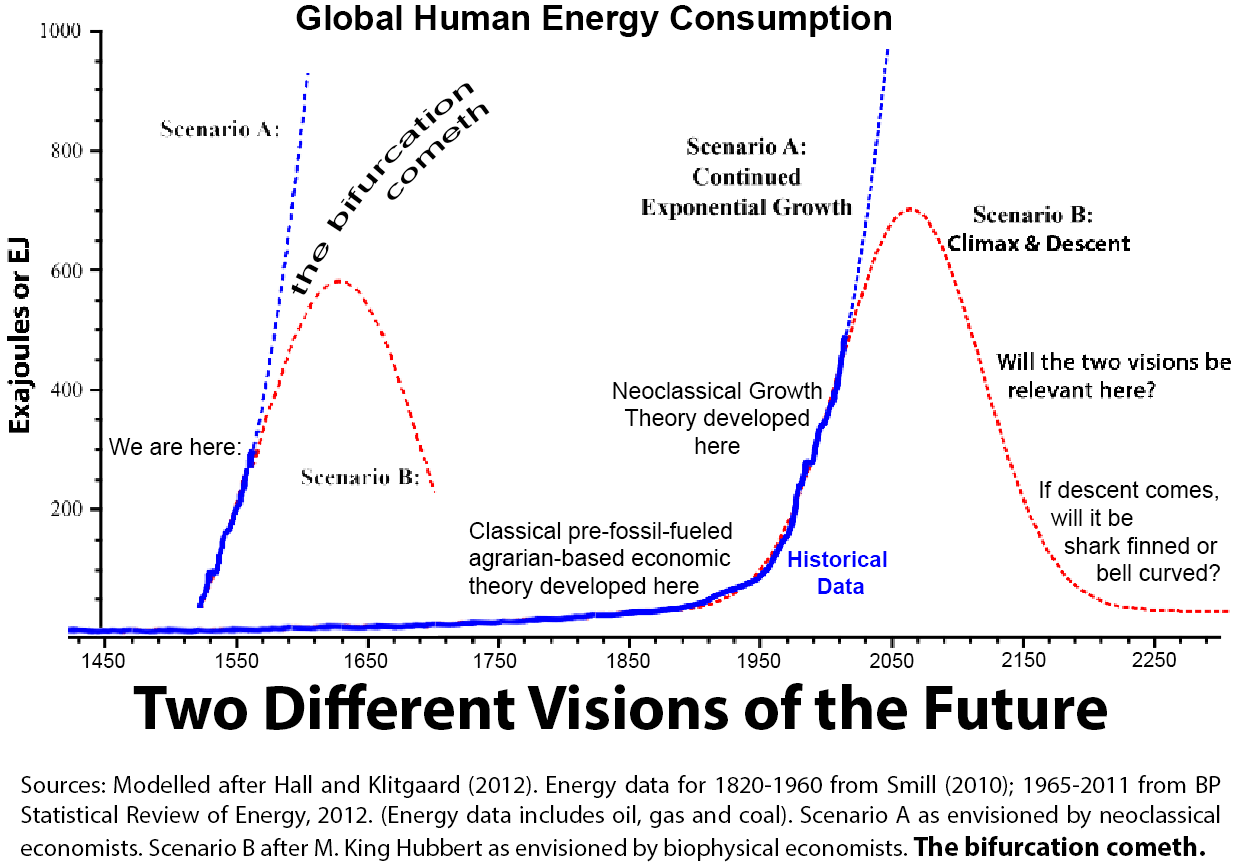
We MTIed ones consider living in our one-off plague-phase overshoot event (during the ongoing growth phase) to be normal. We think growth without limits is the best thing ever. We are right, but only FOR A TIME on the upslope. We MTI ones lack foresight intelligence because our monetary culture selects for short-termism. Sorry about that.
We are in overshoot. Our population (and global economy) will contract. Our Anthropocene overshoot event and its solution (we again become an evolvable system) may be measured in centuries or millennia, but if humanity fails to recover from its MTI condition, if we fail to seek out the condition now that will come anyway, we almost certainly don’t have eons to figure out how to love, understand, and live properly with the planet. Don’t count on having even a millennium. One or a few centuries? One or a few decades? Maybe.
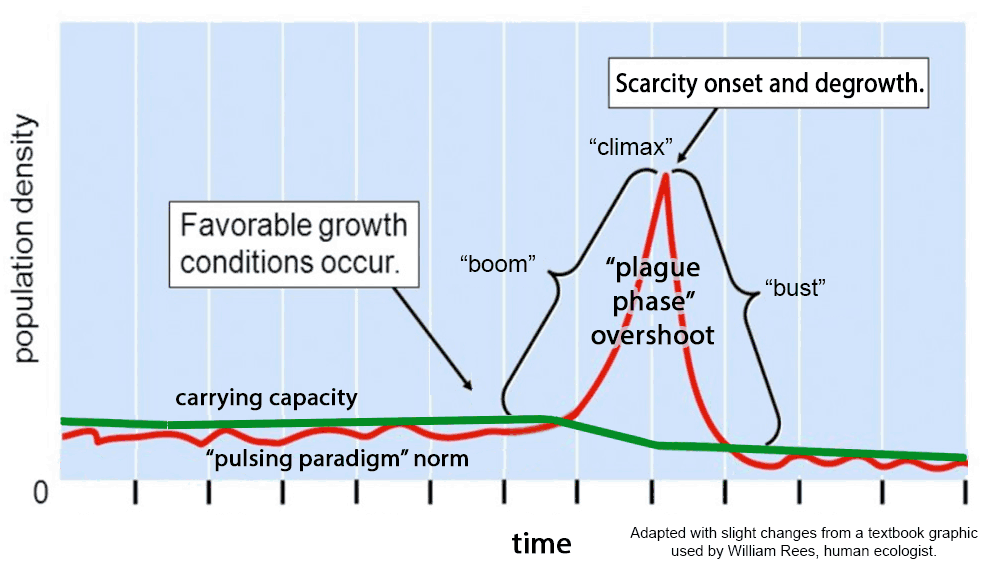
To simplify our predicament, we are like the 515,000 people living on the three islands of Malta that has an environmental carrying capacity (without significant imports) of maybe 800 people given that to live on the islands long term (as the millennia pass) room must be left for Nature who provides all services that allow for the persistence of life on on Malta (and on Earth Island). This is not a belief-based claim based on political or religious certitude. It is what Nature says to those who listen. Those who don’t listen (adapt) go extinct. Could humans living on Malta (or Earth) ever live as one? Perhaps, but not as MTI humans, e.g. The Malta Solution.
Of the perhaps 1,400,000,000 species that have ever lived on Earth, 1,386,000,000 are no more and the rest evolved into forms most beautiful and most wonderful (of which 50% are likely to be lost during the Anthropocene mass extinction event). Our magnificent modern ‘will to power’ by agency/choice will not have that outcome.
"There have been seven [climate change] disasters since humans came on the earth, very similar to the one that's just about to happen. I think these events keep separating the wheat from the chaff. And eventually we'll have a human on the planet that really does understand it and can live with it properly. That's the source of my optimism." James Lovelock who envisions an 80% to 90% die-off event this century.
Nation-states replaced by 25k watershed management units that are members of a United Federation of Watersheds, within which humans manage one fifth of the area to support themselves as hunter-gatherers or low-intensity forager-farmers. On average, the population of humans is a few thousand normally living in small communities of 20 to 50 others, but meeting in a central area (monthly to annually) for a time.
All would agree to defend any other watershed that might be attacked, and to engage only in sustainable trade between watershed management units. My concern is not that in 2124 there won’t be any humans living like Americans today (there may well be some), but that in 2624 any humans remaining may mean the downslope is lasting longer than I would hope. I could be too optimistic.
Optimistically, there could be 25k planets bearing viable civilizations (unlike ours is currently) in the Milky Way. If travel between them was possible (not too slow), and even one became (or already was) an empire builder (like MTI culture is), then the existence of one sovereign planet able to conquer another would become a state of war that would lead to a Borg-like collective unless all members of the Federation would agree to destroy the independent sovereign planet (or at least enforce its permanent containment, i.e. inability to grow by conquest). Will your descendants be Federation or Borg or go extinct in a few centuries? Near-term developments in this century may determine humanity’s outcome. The time to stand and deliver is now.
Spinoza realized that to understand something (e.g. overshoot) is to be delivered from it. If humans understood the exponential function, i.e. that growth is for a time (becoming increasingly detrimental as the lower limit of environmental carrying capacity is exceeded), then our enthusiasm for growth would be moderated.
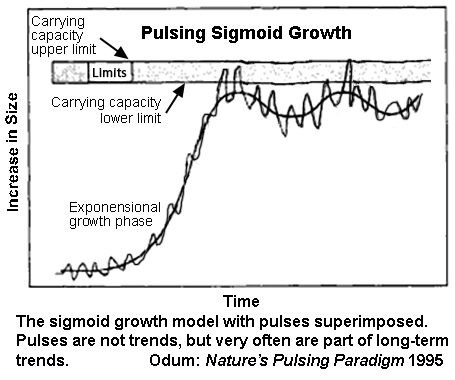
And if we understood that technology enables us to exploit a planetary larder of energy and resources (dismantle a global life-support system), then our enthusiasm for technology (e.g. cars) would be moderated. To understand is to stand down from our hubris heights. In fewer words, we can “understand or die.”
The New York Times has mentioned “ecological overshoot” zero times since 1851 (one opinion piece mentioned “environmental overshoot” to deny it, zero mention of “overshoot and collapse,” but “overshoot” was used 533 times. Apart from “Earth Overshoot Day”, none reference our meta-problem of one-off ecological overshoot). And “climate change” (a politicized distraction from our Anthropocene overshoot event) has been mentioned over 31,000 times (over 12k in the last five years, 66 times a week last year). Compared to the existential threat of climate change, our wicked overshoot problematique should be mentioned at least 666 times a week.
Do we suffer from an information deficit disorder? One caused by the formal/informal education system (schooling system) and those schooled by it? “EVERYONE believes in their own world view.” [Nate Hagens] EVERYONE believes in belief and feels entitled to their worldview, to allow their beliefs to competitively displace information. The more politicized, the more power/influence a person has, the less likely their views will change. Ever.
Very few people can think in systems terms (no one is paid to unless they thereby serve the economy). They are experts in their one area. People defer to the most respected, influential person in the room — a natural ape (clothed or unclothed) instinct. And since the people at the top are techno-optimists who think fossil fuels can be replaced with renewables at little cost by growing the economy, everyone lower in the hierarchy blindly believes likewise. Perhaps no one is sane and the modern techno-industrial consensus narrative is dead wrong, as the consensus narratives for all prior complex societies proved to be wrong.
It is “important to understand that as long as a population or species is in overshoot, it continues (by definition) to deplete resource stocks and energy-flows necessary for its own future survival. In other words, present attempts to maintain and grow the human population is destroying the biophysical basis of our own long-term existence. Present and future carrying capacity at whatever material standard/lifestyle we might choose is steadily being eroded and will continue to be so unless we dramatically, rapidly reduce demand (i.e., absolute consumption and population) or until there is systems collapse.”
It is entirely possible to graduate with highest honors from a top university and know essentially nothing about ecological overshoot, carrying capacity, sustainability, or that there are limits to growth even if you are a STEM/STEAM/STREAM major.
The more inconvenient truth is that most people would rather believe than know. Those who would rather know than believe, who question everything, who reevaluate all values and assumptions, who are abelievers, are some fraction of one percent. This is true for denizens of Facebook echo chambers and most think tanks to which only PhDs who have written at least several books are invited. Because the number of people who understand that we can’t grow ourselves out of overshoot (the exact opposite being the case), e.g. via sustainable development, a Green New Deal, or more nuclear (and fusion and Dyson Dots at L1…), is so small and because they’re just not listened to, it looks like overshoot will run its course as usual. Carrying Capacity, Overshoot and Sustainability
Our collective inability to think about the possibility that there are or ever could be ‘too many people’ on the planet has a long history that goes up to the time I am typing this. Quora is one source of evidence. There are several questions on human ‘over’ population with over a hundred answers. Pick all of them and spend some hours scanning the answers and sorting them into sets of essentially the same answer. Do it as a citizen science project. Instead of watching another movie, updating Facebook, or going shopping…, do it.
Assume that most of those who answer questions on Quora think they know enough to have an opinion-not that they do, just think they do. So the data reflects the opinions of experts, whether academy vetted or not (as part of your study, note whether the answerer has a background in a field at all relevant to the question). Some people are more likely to know enough to have an opinion. For example, Richard Feynman is viewed pretty much by everyone who knows enough to do advanced physics as no ordinary genius. Feynman said, “Science is the belief in the ignorance of experts.”
Was he talking about self-accredited know nothing experts from the hood like me? No, he was talking about academy vetted experts like he worked with. My suggestion is that you listen to those who endeavor to listen to Nature who has all the answers. Then ask Nature questions and listen to the still small voice her data speaks. To be a bit more helpful, here’s a short, readable intro:
World scientists’ warning to humanity — Rex Weyler
Rex Weyler ends by noting: “As an ecologist, I feel compelled to ask myself: if the last 50 years of environmental action, research, warnings, meetings, legislation, regulation, and public awareness has proven insufficient, despite our victories, then what else do we need to do? That question, and an integrated, rigorous, serious answer, needs to be a central theme of the next decade of environmentalism.”
The Fundamental Failure of Environmentalism — David Suzuki
On his 80th birthday, scientist and environmental activist extraordinaire David Suzuki noted that despite some victories of the David Suzuki Foundation and other efforts by environmentalists over the decades, that meanwhile “the pace of planetary destruction has not slowed “. Maybe there are no political solutions. Maybe any “integrated, rigorous, serious answer” will be wholly outside humanity’s (including political activists to full-on eco-fascist revolutionary environmentalist’s) current Overton window of thinkable discourse-for a time-yet know that things change, “this too, shall pass away”, so learn now while access to viable information is still out there.
And always vet the source first (e.g. Weyler, Suzuki and who, if anyone, is publishing them, media bias/fact checkers are your friend and so is Wikipedia if you understand its limitations and bias). ALL UNVETTED SOURCES ARE NOT. Could a source know more than you do? Maybe. If so, maybe resist letting screens distract you and consider that:
WE WERE WARNED
(longer list here)
Harrison Brown, The Challenge of Man's Future 1954
“......we are now living in a phase of history which is destined never to be repeated. For the fifth of the world population that lives in regions of machine culture it is a period of unprecedented abundance. And most of us who are a part of that fortunate one-fifth are so enamoured with the achievements of the last century and with the abundance which has been created that we believe the pace of achievement will continue uninterrupted in the future. However, only a cursory investigation of the present position of machine civilization is needed to uncover the fact that it is indeed in a precarious position. A cosmic gambler, looking at us from afar, would, in all likelihood give substantial odds in favour of the probability that it will soon disappear, never again to come into existence."
Aldous Huxley, TV Interview 1958
Population, Evolution & Birth Control 1964, A Collage of Controversial Readings [from Han Fei to Garrett Hardin]
A Blueprint for Survival 1972
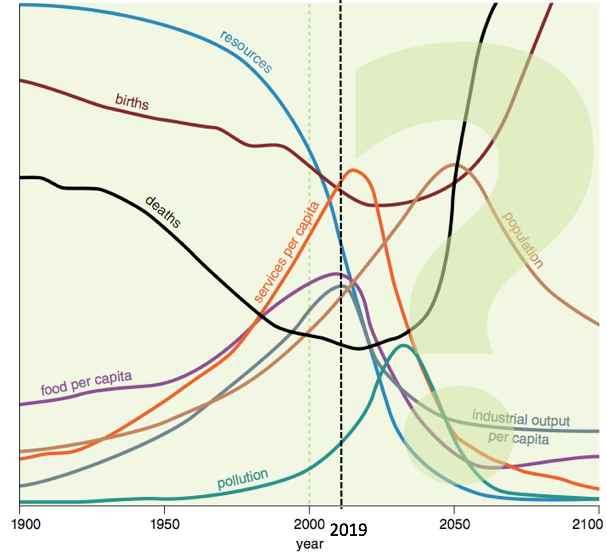
Limits to Growth 1972
"Taking no action to solve these (global) problems, is equivalent to taking strong action. Every day of continued exponential growth brings the world system closer to the limits of that growth. A decision to do nothing is a decision to increase the risk of collapse. We cannot say with certainty how much longer mankind can postpone initiating deliberate control of his growth before he will have lost the chance for control. We suspect, on the basis of present knowledge of the physical constraints of the planet that the growth phase cannot continue...... Again, because of the delays in the system, if the global society waits until those constraints are unmistakably apparent [e.g. until 2030-2070], it will have waited too long".
Overshoot: The Ecological Basis for Revolutionary Change 1980
A Planet for the Taking 1985
An Appeal for Joint Commitment in Science and Religion 1990
Elder Brothers' Warning 1990
World Scientists' Warning to Humanity 1992
Joint statement by fifty-eight of the world's scientific academies 1993
The Anthropocene: conceptual and historical perspectives 2011
Aluna: Elder Brothers' Second Warning 2012
Consensus Statement from Global Scientists 2013
World Scientists’ Warning to Humanity: A Second Notice 2017
Worsening Worldwide Land Degradation Now ‘Critical’ 2018
Living Planet Report of 59 global scientists & overview 2019
The State of the World's Biodiversity for Food and Agriculture 2019
Nature’s Dangerous Decline ‘Unprecedented’ (IPBES) 2019
World Scientists’ Warning of a Climate Emergency 2019
A Discussion and Call to Action on Global Catastrophic Risks 2020
(38 in roundtable, Part 1: Warning. Part 2 and 3: no 'real solutions' considered as consensus limits thinking.)
Wildlife in 'catastrophic decline' due to human destruction, scientists warn 2020
Limits to Growth Updated, Harvard & Yale 2020
Tim Garrett's Audio Warning 2020
International Scholars Warning on Societal Disruption and Collapse 2020
Underestimating the Challenges of Avoiding a Ghastly Future 2021
Freshwater fish in 'catastrophic' decline 2021 BBC summary
FINAL REPORT- Delivering the Human Future 2021 No real solutions
(The world needs a ‘survival revolution’ on a scale far larger than the ‘industrial revolution’)
Global Trends 2040 (2020 may look like the good old days) 2021
WORLD SCIENTISTS’ WARNINGS INTO ACTION, LOCAL TO GLOBAL 2021
(Now yelling and swinging the 2x4 against blindered heads harder)
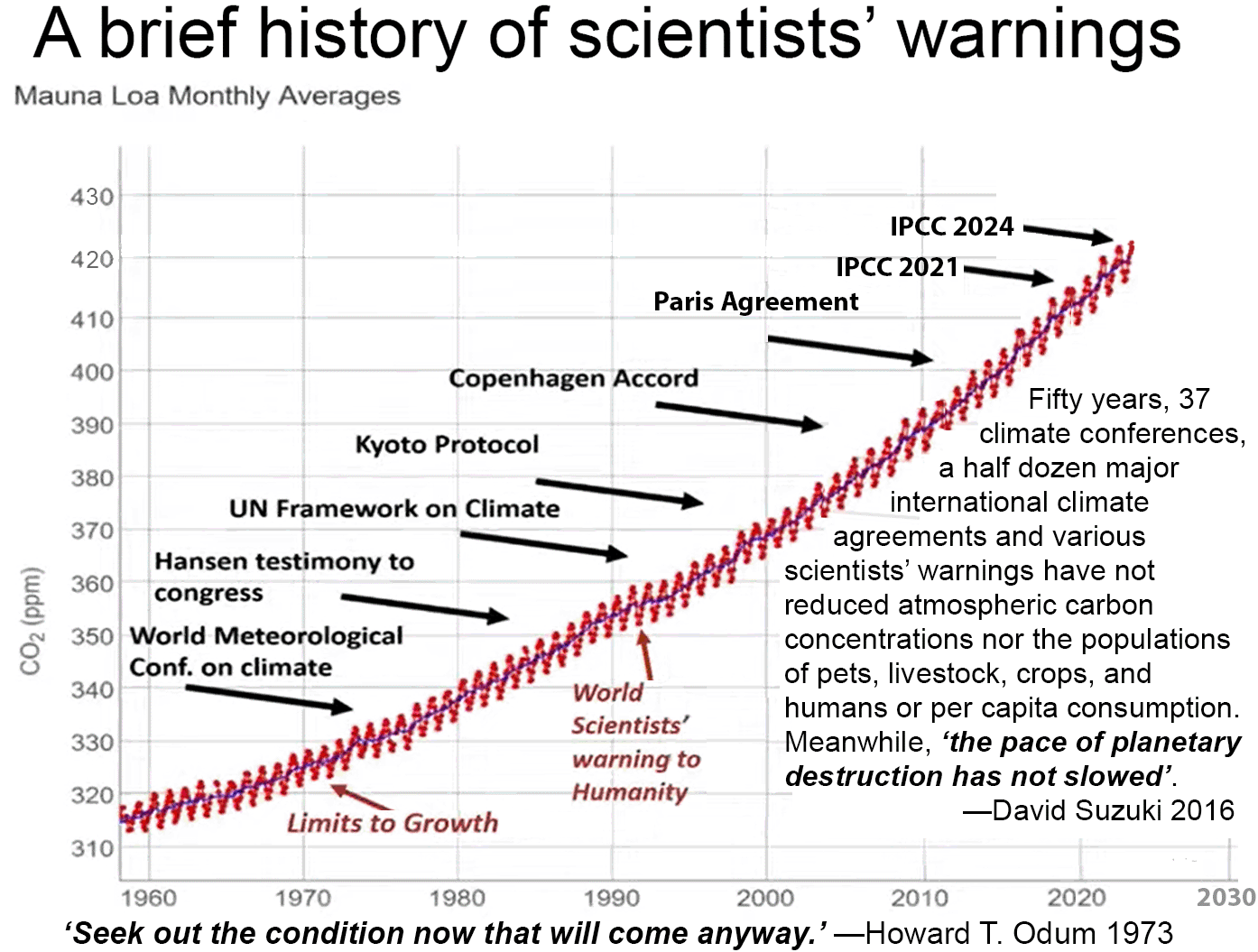
[Imagine that a world scientists' warning has a different outcome (maybe) than all prior ones. A month passes, a button is pressed and 20,736 world leaders (from top down) become unstuck in time. They have no distractions, no need to sleep, eat, breathe, have sex, or garner social approbation. For a timeless period they are intensively educated. Everything every world scientist has to teach is assimilated. The ether they inhabit is incompatible with error, and so all error associated with the warnings has been filtered out and as they now know everything that matters that every scientist had to teach, each leader far exceeds any of their individual teachers in understanding the human predicament. In the end all have triumphed over their inability to understand the implications of the exponential function. There is nothing more to learn about thermodynamics, the energetics of complex systems, carrying capacity, or overshoot. That humans are subsystems of Gaia from whom no decoupling is possible is as mother's milk to them. Thinking in systems has become child's play. In less than a heartbeat they find themselves back in their positions of power, privilege, and prestige as top government, business, media, NGO, military, university and religious leaders. All receive an invitation to join a Zoom meeting of 20,735 other leaders to discuss coming up with a plan of action to turn MTI (modern techno-industrial) society (that automatically thwarts all attempts to change its trajectory) into its opposite. The newly educated world leaders are 0.0001939% of the human population, but nearly 0.0004% of we adult hu-mans they serve or pretend to rule as leaders, i.e. 'mere puppets they, who come and go at bidding of vast formless things'.]
Update: Leaders did not grow the fossil-fueled modern techno-industrial socio-political economic system [MTI Empire], nor can they degrow it. Of the 20,736 leaders, some acted on their understanding and were rapidly selected out of the system. Others, in all knowingness, go with the humancentric flow to nudge it as best they can and thrive. After retirement, they attend Club of Rome meetings. There are no political solutions.
"In order to change an existing paradigm you do not struggle to try and change the problematic model. You create a new model and make the old one obsolete. That, in essence, is the higher service to which we are all being called." —R. Buckminster Fuller
In an alternate time line, the leaders are randomly divided into 1,728 groups of 12. Each group spends six months getting to know each other and discussing the human problematique (while adding to their understanding of it). Each group then selects a leader who can be replaced at any time by consensus of the eleven. The 1,728 leaders are randomly divided into groups of 12 who take a year to get to know each other and discuss issues. They agree upon who represents them. The 144 second cut leaders repeat the process. In a year there are 12 leaders able to make rapid emergency decisions. Of the 12 on the High Counsel, one would serve, for some hours as the supreme leader of the sapientocracy, to make decisions in extreme emergencies before the other 11 could consider the issue, whose decision would strand until the 144 could consider the issue and so on to the 20,736 representatives of each Watershed Management Unit of Earth. Only those who demonstrably knew enough (about the limits of their knowledge) to have an opinion would serve, for a time, to offer their best posterity and biosphere serving guess.
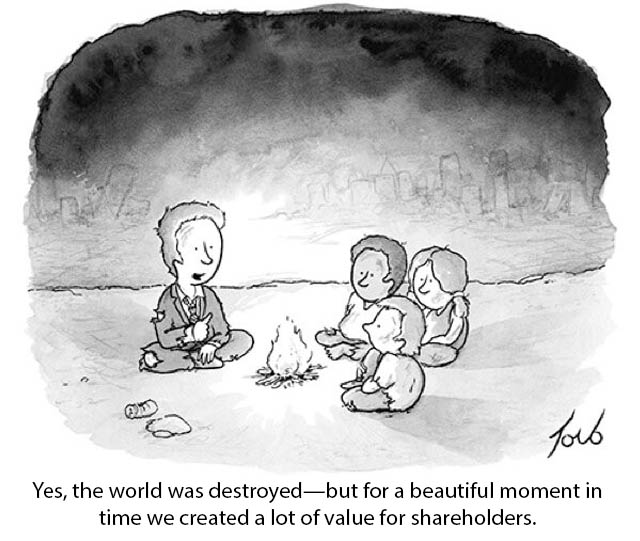
3/11/22 SUBNOTE TO FILE:
Apparently Quora canceled me without notice. I noticed that the last six posts has no or few views, and that if I log out as me and log back in as my wife, I can no longer see my answers to questions (hence others can’t either). When I log back in as me, all looks as usual except for a lack of views.
Sometimes essentially the same answer would get 20 views on up into the thousands which I presumed depended on Quora promotion. Perhaps Quora AI detected repetition of links and selects against posts containing repetitive content. Quora allows for downvotes but results are apparently for internal use only. Whatever, the change is of no matter to me as I don’t answer questions for Quora reader consumption though some few could benefit if they follow links, but to think about questions and answers. My imagined reader is posterity.
When logged out I can search for and see my profile and list of answers, but if I click on a question I’ve answered, my answer is not visible. My answers often included the list of links to scientist’s warnings posted after giving a brief answer, and one was not made to go away (one moderator’s day off?), but all others recently have been effectively removed without notice by one (or more) Quora moderator(s). For three years moderators had no issues with my answers.
No indication why and when logged in, no indication of being depreciated. Quora, like all social media, is not in the business of telling people other than what they want to hear, so I may not in good standing with their aims. This dynamic may be the death of humanity’s posterity.
For several years I received daily email from Quora with questions they wanted me to answer and requests from questioners that I answer their question. I now seem to get mostly questions of the sort I have never answered. I can answer questions, but I have to poke around to find any I might consider answering (to share links that matter). I can continue to reply to Quora questions, but no one will see them, so I give up, I lose.
It may be that the only justification for answering Quora questions is as a pretext for sharing links to information that matters. If I continue to post only answers that include inconvenient links, none may be read by anyone on Quora. My last answer from 16 hours ago, canceled on Quora, follows just because I can cut and paste it here. The world of memes is constantly being made safer for humanity by all media which is the message.
What should I study now to contribute in future sustainability and contribute in the process of saving planet Earth from climate change to finding a second planet home?
To contribute to saving planet Earth (its biosphere as it is not endangered as a rock) from destruction (e.g. the current mass extinction event, aka Anthropocene), first understand the cause, i.e. the current one-off overshoot event of modern techno-industrial (MTI) society, now global. To understand, you need to be able to think in systems, you need to understand the dynamics of complex, adaptive, dissipative and evolvable systems. To persist, humans must again become evolvable. Currently we are a non-evolvable dissipative structure (MTI society is like a hurricane, full of sound and fury dissipating a planetary larder of fossil fuels, but signifying nothing) rather than an evolvable system.
A systems science fiction short story may be a starting point.
https://www.sustainable.soltechdesigns.com/the-exceptional-ones.htmlFor the real deal, read Donella Meadows’ Thinking in Systems.
https://wtf.tw/ref/meadows.pdfAnd, yes, there is more to consider and understand. Start with what those few humans who endeavor to listen to Nature have to say about what Nature is telling them (aka scientists). Before endeavoring to understand our problematique, consider the cause.
 We humans are clever apes, too clever by half, but not nearly smart enough.
We humans are clever apes, too clever by half, but not nearly smart enough.
If you don’t know that climate change is a distraction (from our condition of overshoot to be followed by collapse), then you are a product of the MTI education system who by chance never had exposure to anyone who is systems science literate and actually understands carrying capacity and overshoot (i.e. that humans are not exempt).
We modern techno-industrialized (MTIed) ones consider living in a one-off plague-phase overshoot event to be normal....
3/12/23 SUBNOTE TO FILE:
I posted the first few paragraphs of an answer related to overshoot and after 8 hours had 21 views and one upvote. I edited the post to add the links:
What is the actual limit of people expected on the Earth?
Demographers assume no limits and project prior and current trends. Biophysical economists assume limits and foresee climax, likely this century.
Conventional neoclassical economists assume no limits and foresee tens of billions, if not more, prosperous consumers in our future.
PS: Systems ecologists have the better (reality-based) view. But nobody likes it. Not good news for 10 year olds.
We modern techno-industrialized (MTIed) ones consider living in a one-off plague-phase overshoot event to be normal....
It was immediately removed other than from my view, so no more views, no information taken in or shared. This is how the world ends.
3/18/22 SUBNOTE TO FILE — SF Short:
Vastly simplifying our predicament may help. Any predicament three astronauts might face would be vastly simpler than humanity now faces.
Assume an Apollo 13-like situation. Within 10 minutes, all three astronauts assess their predicament as hopeless. Mission Control asks everyone involved on the ground if they agree. Within another hour a consensus emerges that while the situation is indeed wicked, that all possible solutions are to consider including wicked ones, and that six possible courses of action were being considered.
One, maybe more, could conceivably work. If the janitor (Good Will Hunting) has an idea, it will be considered. If any plan to return astronauts to Earth could work, there was a four hour window to implement it.
Given the dire situation, NASA calls Andrew Gaines for therapeutic intervention. The astronauts had to reframe their worldview to be part of any real solution.
An hour later, the astronauts are able to consider what Jack Alpert has to say. He notes that everyone who might know enough to have an opinion had been in on considering all plans that could possibly work (even that of a Nazi scientist in Ukraine). Given the time constraints, a consensus had emerged that one proposed solution would likely work.
The solution required reducing the weight (mass) of the command module. Every possible bit of non-essential material had to be jettisoned within an hour. Every possibility had been considered down to unneeded screws, panels, even laxatives and removing as much blood as possible (without causing death) from each astronaut and jettisoning it had been added to the list.
Jack pauses for a moment, then adds that per the cold equations, it won’t be enough. He continues, noting that per best guess estimate, if one astronaut’s body is jettisoned, there will be less than a 5% chance of returning the other two. If two bodies are jettisoned (and medical says rapid euthanasia can be arranged) that there is maybe a 5% chance of something unforeseen preventing the remaining astronaut from making it back safely.
Jack and team wished there was any other alternative, but sorry to say, there isn’t. Nature alone decides what might work and all have strained mightily to listen. This is the situation, Jack notes, adding that what the astronauts do with the information will be their call.
At this point, all can decide to keep on going past Earth together until they can’t remain conscious. All three could euthanize themselves together. Or one or two do and if two, then one astronaut likely gets back. Maybe one insists they euthanize together and somehow fails to hit his button at exactly the same time as the other two.
He suppresses his Loki smile and contacts NASA to announce that the other two insisted that only the best and brightest, the most selfless and spiritually enlightened among them survive to serve mankind by running for high office.
Each astronaut can understand the cold equations and the options. No one but the one astronaut will ever know what happened. Jack did not foresee the outcome (the surviving astronaut is elected democratically but ends up as world dictator leading unintentionally to human extinction). All anyone knows is….
"And that’s the news. We should know within an hour what the astronauts decided to do. Even if they decide to not decide, their doing nothing will decide matters."
SUBNOTE TO FILE 5/13/21:
"By 2050, the worldwide vehicle population is expected to grow to 2.5 billion from the current 1 billion or so, which is more than double. We are running out of time. I implore vehicle manufacturers, politicians and legislators to consider the steam engine — failure to do so would be proof of the irretrievable madness of man." From: 'Why the steam car must make a comeback' by Sebastian Broady, PhD scientist and writer.
 If there are 9 billion people who need food in 2050 (e.g. if there were a shortage), then we must grow more food even if more food is turned into more people by those who want to procreate (or make money if their government pays them to help grow the economy). If solar cars and hydrogen cars, and other forms of cars powered by our energy slaves (or animal/human ones if need be) are in short supply, then steam powered cars will meet the needs of 2.5 billion (or more) people who must have cars (ask them). They will be powered by wood pellets, or Soylent Green pellets, or any of hundreds of alternative pellets. They will fill a trunk-sized tank in seconds from gravity powered bins. If there were ever a shortage of pellets, the poor could make money harvesting biomass for the taking to make more pellets.
If there are 9 billion people who need food in 2050 (e.g. if there were a shortage), then we must grow more food even if more food is turned into more people by those who want to procreate (or make money if their government pays them to help grow the economy). If solar cars and hydrogen cars, and other forms of cars powered by our energy slaves (or animal/human ones if need be) are in short supply, then steam powered cars will meet the needs of 2.5 billion (or more) people who must have cars (ask them). They will be powered by wood pellets, or Soylent Green pellets, or any of hundreds of alternative pellets. They will fill a trunk-sized tank in seconds from gravity powered bins. If there were ever a shortage of pellets, the poor could make money harvesting biomass for the taking to make more pellets.
Failure to provide as many people as much food as they need, or cars for people who need to go places, would be proof of the irretrievable madness of man. Oh, wait, doing so would be proof of the irretrievable madness of properly educated modern techno-industrialized humans (the inecolate). Sorry about that.

